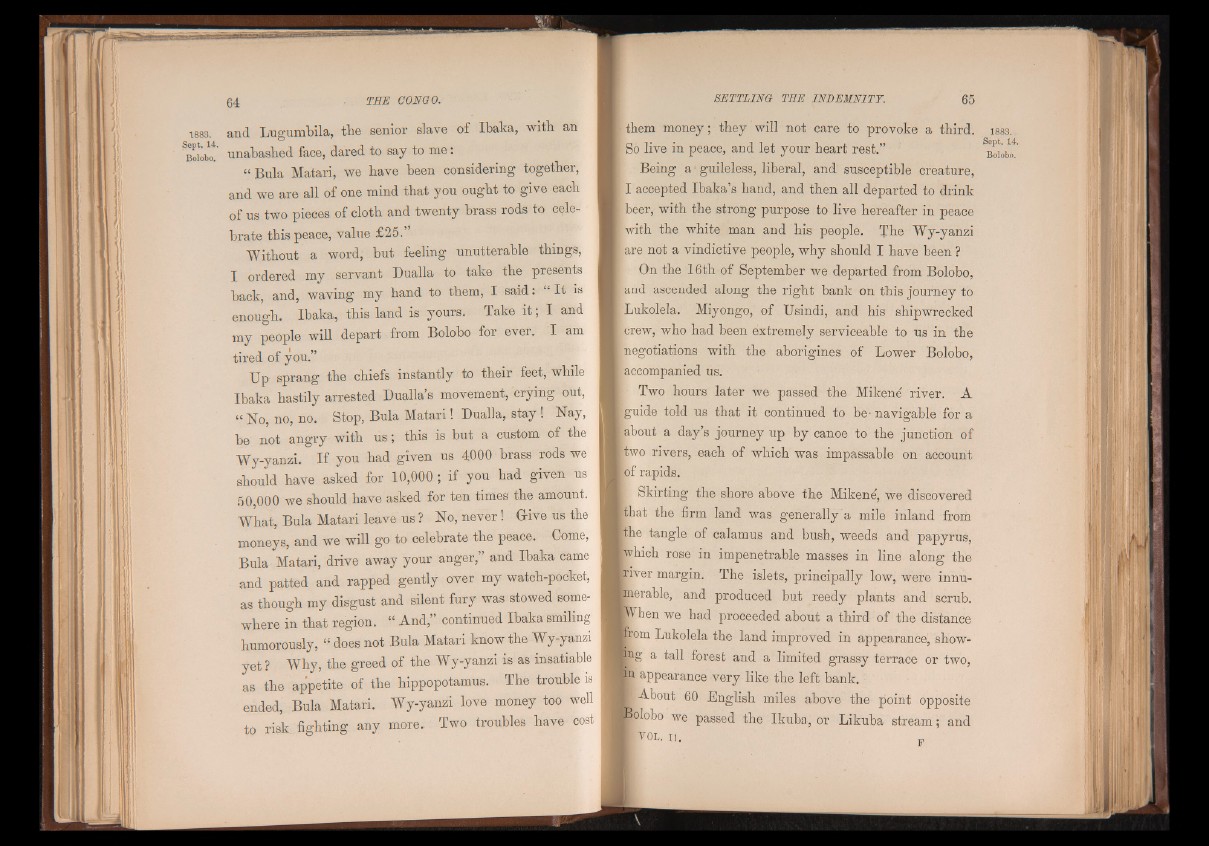
Bolobo.
and Lugumbila, the senior slave of Ibaka, with an
unabashed face, dared to say to me:
“ Bula Matari, we have been considering together,
and we are all of one mind that you ought to give each
of us two pieces of cloth and twenty brass rods to celebrate
this peace, value £25.
Without a word, but feeling unutterable things,
I ordered my servant Dualla to take the presents
back, and, waving my hand to them, I said: “ I t is
enough. Ibaka, this land is yours. Take it | I and
my people will depart from Bolobo for ever. I am
tired of you.”
Up sprang the chiefs instantly to their feet, while
Ibaka hastily arrested Dualla’s movement, crying out,
“ No, no, no. Stop, Bula Matari| Dualla, stay ! Nay,
be not angry with u s ; this is but a custom of the
Wy-yanzi. If you had given us 4000 brass rods we
should have asked for 10,000; if you had given us
50,000 we should have asked for ten times the amount.
What, Bula Matari leave us ? No, never ! G-ive us the
moneys, and we will go to celebrate the peace. Come, |
Bula Matari, drive away your anger,” and Ibaka came
and patted and rapped gently over my watch-pocket,
as though my disgust and silent fury was stowed somewhere
in that region. “ And,’ continued Ibaka smiling
humorously, “ does not Bula Matari know the Wy-yanzi
yet? Why, the greed of the Wy-yanzi is as insatiable
as the appetite of the hippopotamus. The trouble is
ended, Bula Matari. Wy-yanzi love money too well
to risk fighting any more. Two troubles have cost
them money; they will not care to provoke a third.
So live in peace, and let your heart rest.”
Being a - guileless, liberal, and susceptible creature,
I accepted Ibaka’s hand, and then all departed to drink
beer, with the strong purpose to live hereafter in peace
with the white man and his people. The Wy-yanzi
are not a vindictive people, why should I have been ?
On the 16th of September we departed from Bolobo,
and ascended along the right bank on this journey to
Lulcolela. Miyongo, of Usindi, and his shipwrecked
crew, who had been extremely serviceable to us in the
negotiations with the aborigines of Lower Bolobo,
accompanied us.
Two hours later we passed the Mikene' river. A
guide told us that it continued to be- navigable for a
Jabout a day’s journey up by canoe to the junction of
| two rivers, each of which was impassable on account
| of rapids.
Skirting the shore above the Mikene, we discovered
that the firm land was generally a mile inland from
[the tangle of calamus and bush, weeds and papyrus,
which rose in impenetrable masses in line along the
■river margin. The islets, principally low, were innumerable,
and produced but reedy plants and scrub,
when we had proceeded about a third of the distance
from Lukolela the land improved in appearance, show-
■ g a tall forest and a limited grassy terrace or two,
in appearance very like the left bank.
■About 60 English miles above the point opposite
Polobo we passed the Ikuba, or Likuba stream; and